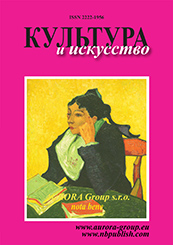Audiovisual culture and art
Reference:
Shumov, M.V. (2025). The image of an alien in Soviet cinema of the 1950s and 1980s from science fiction to philosophical allegory. Culture and Art, 4, 69–87. https://doi.org/10.7256/2454-0625.2025.4.74139
Read the article
First Peer Review:
Second Peer Review:
Third Peer Review:
|
EDN: AJKMFM

|
Abstract:
The object of this study is Soviet science fiction cinema of the 1950s to 1980s. The subject of the research is the image of the alien in Soviet cinema from the 1950s to the 1980s in visual, narrative, and symbolic structures. The article examines the key stages of the transformation of this image—from the early utopian model of the "other" to complex metaphysical and allegorical figures in late Soviet cinema. Special attention is given to the visual, genre, and stylistic means used to create the alien image: sets, lighting and editing dramaturgy, artistic codes of animation and live-action cinema, as well as sound and spatial solutions. The theoretical and methodological basis for this work includes the works of domestic researchers M. Yampolsky, M. Kogan, O. Kozhemyako, A. Sinitsin, I. Zhukov, S. Lem, S. Dobin, E. Ryazantseva, M. Voronin, N. Gromov, I. Kondakov, E. Ulyanova, V. Zhitenyov, as well as foreign researchers T. Dobzhansky, S. Lem, R. Lewis, Y. Tsivian, M. Smith, G. Roberts. The research methods include semiotic and visual-analytical methods, which provide an interpretation of the sign and symbolic structures that form the image of the alien, intertextual analysis that allows establishing connections between cinema and literary fiction (the works of Yefremov, Strugatsky, Lem, etc.), and a comparative method that enables the juxtaposition of different stages and stylistic traditions within the genre. The main conclusions of the study show that the image of the alien in Soviet cinema evolved from the embodiment of technocratic hope and dreams of interstellar solidarity to a visual expression of philosophical crises and ideological doubts. It becomes less a figure of the external other and more a screen metaphor for the inner self, God, conscience, utopia, and fear. The research demonstrates that through this image, Soviet cinema expressed both collective aspirations for the future and the hidden contradictions of cultural identity. The scientific novelty of the study lies in the comprehensive analysis of the image of the alien in Soviet cinema, emphasizing its artistic transformation: from a character of a utopian project to an allegorical figure of cultural and philosophical reflection. For the first time, this work conducts a systematic comparison of the visual and meaningful strategies involved in creating this image across different decades.
Keywords:
Artistic means, Screen image, Ideology in art, Genre transformation, Philosophical allegory, Otherness, Visual culture, Alien, Science fiction, Soviet cinema
 This work is licensed under a Creative Commons Attribution-NonCommercial 4.0 International License.
This work is licensed under a Creative Commons Attribution-NonCommercial 4.0 International License.
 Eng
Eng












 © 1998 – 2025 Nota Bene. Publishing Technologies. NB-Media Ltd.
© 1998 – 2025 Nota Bene. Publishing Technologies. NB-Media Ltd.




